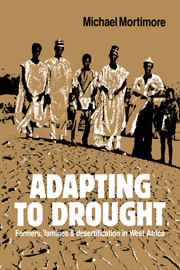Book contents
- Frontmatter
- Contents
- List of figures
- List of plates
- List of tables
- Preface
- Acknowledgements
- A note on conventions and list of abbreviations
- 1 Introduction
- 2 From feast to famine?
- 3 Drought in the 1970s
- 4 Thirteen years in the life of a village
- 5 Wider horizons
- 6 Two dry decades
- 7 Shifting sands
- 8 Interpretation
- 9 Policy directions
- Notes
- Bibliography
- Index
- Frontmatter
- Contents
- List of figures
- List of plates
- List of tables
- Preface
- Acknowledgements
- A note on conventions and list of abbreviations
- 1 Introduction
- 2 From feast to famine?
- 3 Drought in the 1970s
- 4 Thirteen years in the life of a village
- 5 Wider horizons
- 6 Two dry decades
- 7 Shifting sands
- 8 Interpretation
- 9 Policy directions
- Notes
- Bibliography
- Index
Summary
CRISIS IN RURAL TROPICAL AFRICA
The problem is not whether there is a crisis in rural Africa, but what its nature really is. Food shortages are occurring yearly in different parts of the continent. Since the Sahelian Drought of the 1970s, they have captured the able and compassionate attention of film-makers and provoked unprecedented international awareness, charitable giving and voluntary agency activity. But rural poverty is not new to Africa. It has persisted through half a century or more of colonialism, two decades of independence, and many ambitious programmes of development aid. Neither the drive towards industrialisation in the sixties nor a contemporary emphasis on the transformation of agriculture has yet succeeded in abolishing it. The blame has swung widely between the natural environment on the one hand, through various local economic and political constraints, to international indebtedness on the other, but a solution seems as elusive as ever. Failure to arrive at a consensus is embarrassing for applied science, but not altogether surprising in view of the high level of generality at which many prefer to discuss the affairs of this vastly diverse continent.
Diagnostic and prescriptive fashions succeed one another almost as rapidly as the ups and downs of the African rainfall. For the farming sector alone, a plethora of constraints has been identified.
- Type
- Chapter
- Information
- Adapting to DroughtFarmers, Famines and Desertification in West Africa, pp. 1 - 22Publisher: Cambridge University PressPrint publication year: 1989



